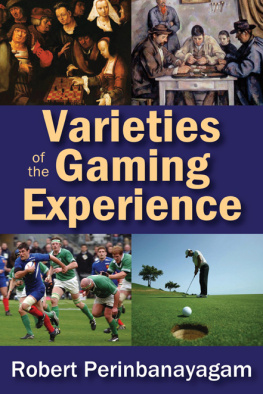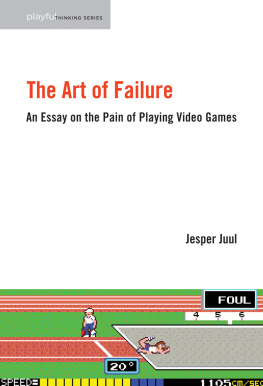

Robert Perinbanayagam

Transaction Publishers
New Brunswick (U.S.A.) and London (U.K.)
Copyright 2015 by Transaction Publishers, New Brunswick, New Jersey.
All rights reserved under International and Pan-American Copyright Conventions. No part of this book may be reproduced or transmitted in any form or by any means, electronic or mechanical, including photocopy, recording, or any information storage and retrieval system, without prior permission in writing from the publisher. All inquiries should be addressed to Transaction Publishers, 10 Corporate Place South, Piscataway, New Jersey 08854. www.transactionpub.com
This book is printed on acid-free paper that meets the American National Standard for Permanence of Paper for Printed Library Materials.
Library of Congress Catalog Number: 2014009844
ISBN: 978-1-4128-5471-9
Printed in the United States of America
Library of Congress Cataloging-in-Publication Data
Perinbanayagam, R. S., 1934-
Varieties of the gaming experience / Robert Perinbanayagam.
pages cm
Includes bibliographical references and index.
ISBN 978-1-4128-5471-9
1. Games--Social aspects. 2. Interpersonal relations. 3. Identity (Psychology) 4. Social psychology. I. Title.
GV1201.38.P47 2015
306.487--dc23
2014009844
To Murray Straus, who brought Sociology to Sri Lanka and then
later brought me to the USA, a debt long overdue.
What do they know of cricket, who only cricket know?
C.L.R. James
Contents
A few years back I published a book on games and sports in everyday life. The current work is a continuation in some ways of that book, but mainly it examines games from the point of view of the player and the meaning of playing games to him or her. To begin, I examine games as systems which embody both a metaphysics and a pragmatics of action. I then draw on the ideas of various religions and their respective approaches to the playing of games by their adherents. I then examine games as forms of activity in which the human agent as an actor engages with others in various interactional situations. Such engagement with others in gaming situations creates dramas in which agents perform identities, give play to emotions, and enrich their selves. Finally, I also deal with the issue of the writing of gamesor rather, how a few selected writers have used the structures of games as narrative devices in their work. Instead of surveying the vast array of documents that describe the gaming experience, I have selected certain strategic examples and anecdotes to illustrate my sociological interpretations.
In the production of this work I have been helped by many friends. I must thank Terry McCarthy for skillfully deciphering my handwriting and turning it into typescript. I am indeed beholden to her for the patience and insight with which she was able to undertake this task. Doyle McCarthy, my colleague and collaborator on many projects, and Judy Frost were of great help in clarifying my ideas and correcting my errors. Finally, I must thank Lynn Cross, editor, for the dedicated and intelligent work she did on my manuscript.
If all the year were playing holidays,
To sport would be as tedious as to work.
Shakespeare, Henry IV
I cited the words of the incomparable philosopher of cricket, C. L. R. James, who was also a professor of history and a political activist, as the epigraph to this work: What do they know of cricket who only cricket know? This line could be profitably amended to read: What do they know of games who only games know? Games, the experiencing of games in all their magnificent variety, is more than just playing them for physical exercise, recreation, and relaxation. It is in fact their complex presence in the lives of individuals and communities that I propose to investigate in this work, no doubt only partially.
Human agents live in small and large aggregations and manage their relationships with each other, not in accordance with their instincts, despite rumors to the contrary, but in accordance with rules and regulations formulated by themselves or their ancestors. It is this incontrovertible circumstance about human living that is recreated in an encapsulated and idealized form in the games that human societies have devised over the centuries. The playing of games, in accordance with mutually accepted rules, it appears, is an activity that is found in all cultures and civilizations, from the simple games played by the Inuit people in their harsh environment to the complex games played in other societies. In fact the historian Barbara Tuchman has gone to the extent of claiming, Homo Ludens, man at play, is surely as significant a figure as man at work or war. In human activity the invention of the ball may be said to rank alongside that of the wheel (1980:99). I may add that the invention of playing cards and dice should rank alongside the ball. There is not a single person in the world today, I venture to say, or in the history of the world, or perhaps even in its prehistory, who has not played even the simplest of games, even without balls to help him or her. Johan Huizingas masterpiece, Homo Ludens, is often cited with awejustifiably, no doubtbut it is not really about games as such but about the play element in culture, an element that Huizinga finds over and over again.
The games that human societies have devised over the centuries can be considered one of the most comprehensive and fertile symbolic systems ever devised by human ingenuity. In all societies, members face the imperative to interact with each other and communicate with each other as much as possible. As linguistic creatures, human agents use language to establish social and interpersonal contactsand keep on doing it. Language is, above all, an addressive medium. It survives and flourishes in the human consciousness when it is used to address others and incorporate them thereinwhether as intimates or adversaries. Indeed, language exists primarily in conversations between human agents. Even when human agents put language into written forms, they are addressed to others in the hope that they will be read. Such addressivity is usually achieved through purely linguistic forms, but such forms can be transformed into other media and used to address others and incorporate them into ones self.
Such incorporation of the other into ones own self and allowing the other to do the same is not always a benign or cordial or affable process, but rather one in which there is often at least some degree of contention and dissension and even acrimonious argument. Further, there is also an unequal status and power relationship between the contenders, even if it is only a momentary one. Such contentions are standard processes in ordinary human intercourse, and these contentions are not only the struggle for domination and supremacy but also an assertion of self and an attempt to color and tone ones identity. Every human interaction has these qualitieseither in overt and conspicuous ways or in subtle and understated styles. Further, such contests are not only used to define the nature of the interaction and the relationship which the interaction sustains, but are also addressed, in one way or the other, to an audience of significant others, either directly present or not.
These conditions of dialogue and contention are recreated in the games that human agents play. Every move in the game is not only an addressive move but an assertive one that announces ones self and ones character and demands a response and recognition. Games played between two human entitieseither as teams or as individualsconsist, to begin with, of two agents contending with each other for supremacy. Such contentions are handled in some games without physical confrontation, and the play is gentle, following the Shakespearean adage The gentler gamester is the soonest winner, while others, such as boxing, American football, and ice hockey (a game in which the proceedings are frequently interrupted by actual fisticuffs), are frankly violent confrontations. The game of boxing is particularly instructive here: in everyday life human agents find themselves in serious arguments, which sometimes lead to fistfights. Boxing is a systemization of this interaction, with strict rules and a referee. Boxing is, then, an argument conducted with means other than words, while an argument can be characterized as boxing conducted with words. Boxing can affect the adversarys body, while arguments affect the selves of the protagonists.
Next page








